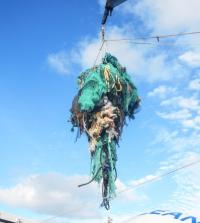
Ghost nets — Photo: The Ocean Cleanup
Yahoo recently reported that a group of divers happened upon a gruesome sight in the Cayman Islands — hundreds of decomposing sharks and other sea creatures tangled up in a floating “ghost net.”
Dominick Martin-Mayes, a 27-year-old fisherman and diving instructor, told the Independent that he was with a group of friends when they found the “solid net of dead, decomposing fish and sharks.”
Ghost nets are fishing nets that have been left or lost in the ocean by fishermen and that continue to entangle, trap and kill fish and other sea life long after they have been abandoned or lost.
The problem of ghost nets and other abandoned fishing gear is not limited to the Caymans or just the Caribbean. As we posted last March, The conservation group World Animal Protection estimates that around 640,000 tonnes of so-called ‘ghost gear’ is left in oceans each year. This ghost nets and gear continues to catch and kill fish and animals as large as whales. The International Whaling Commission estimates that 308,000 whales and dolphins die annually due to entanglement in fishing gear, and more still in marine debris.
Current studies suggest that at least 46% of the floating debris in the Great Pacific Garbage Patch are fishing nets and related cordage. These “ghost nets” are a major threat to fish populations around the world and pose an entirely different set of challenges in any potential cleanup.
The Ocean Voyages Institute, founded by Mary Crowley, has been handing out special GPS transponders to Pacific mariners, asking them to attach the transponders to any abandoned fishing gear they find. Last summer, the institute chartered the sailing auxiliary cargo ship Kwai to collect 40 tons of ghost nets and other plastic waste tagged by the transponders from the Pacific Garbage Patch.
Thanks to Alaric Bond for contributing to this post.

This is a terrible problem, and a tragic legacy from years of fishing practices which were unsustainable. Thanks for reprising the role that SV KWAI played last summer in removing over 40 tons of plastic and disposing of it ashore in Oahu (burned, I believe, to create energy). What we are doing to our oceans is reprehensible and irresponsible. There are horrible long term consequences. Today in the NY Times, there is a front page article about cold stunned sea turtles which get caught in Massachusetts Bay and wash up on the north shore of Cape Cod. Some are found during regular beach patrols by volunteers and rehabbed on the Cape and in Boston, then those which survive are flown to Florida. The article mentioned that several had been rescued before, in 2017 and 2018………